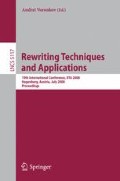Abstract
Tree automata modulo associativity and commutativity axioms, called AC tree automata, accept trees by iterating the transition modulo equational reasoning. The class of languages accepted by monotone AC tree automata is known to include the solution set of the inequality \(x \times y \geqslant z\), which implies that the class properly includes the AC closure of regular tree languages. In the paper, we characterize more precisely the expressiveness of monotone AC tree automata, based on the observation that, in addition to polynomials, a class of exponential constraints (called monotone exponential Diophantine inequalities) can be expressed by monotone AC tree automata with a minimal signature. Moreover, we show that a class of arithmetic logic consisting of monotone exponential Diophantine inequalities is definable by monotone AC tree automata. The results presented in the paper are obtained by applying our novel tree automata technique, called linearly bounded projection.
Access this chapter
Tax calculation will be finalised at checkout
Purchases are for personal use only
Preview
Unable to display preview. Download preview PDF.
References
Baader, F., Nipkow, T.: Term Rewriting and All That. Cambridge University Press, Cambridge (1998)
Boneva, I., Talbot, J.-M., Tison, S.: Expressiveness of a Spatial Logic for Trees. In: Proc. of 20th LICS, Chicago (USA), pp. 280–289. IEEE Computer Society, Los Alamitos (2005)
Comon-Lundh, H., Dauchet, M., Gilleron, R., Jacquemard, F., Lugiez, D., Tison, S., Tommasi, M.: Tree Automata Techniques and Applications, draft (2005), http://www.grappa.univ-lille3.fr/tata
Dal Zilio, S., Lugiez, D.: XML Schema, Tree Logic and Sheaves Automata. Applicable Algebra in Engineering, Communication and Computing 17, 337–377 (2006)
Ginsburg, S., Spanier, E.H.: Semigroups, Presburger Formulas, and Languages. Pacific Journal of Mathematics 16, 285–296 (1966)
Ginsburg, S.: The Mathematical Theory of Context-Free Languages. McGraw-Hill, New York (1966)
Hack, M.H.T.: Decidability Questions for Petri Nets, Ph.D. thesis, Massachusetts Institute of Technology, USA (1976)
Henzinger, T.A.: The Theory of Hybrid Automata. In: Proc. of 11th LICS, New Brunswick (USA). IEEE Computer Society, Los Alamitos (1996) (Extended version), http://mtc.epfl.ch/~tah/Publications
Hinman, P.G.: Fundamentals of Mathematical Logic. A K Peters (2005)
Kobayashi, N., Ohsaki, H.: Tree Automata for Non-Linear Arithmetic, draft (February 2008), http://staff.aist.go.jp/hitoshi.ohsaki/
Kudlek, M., Mitrana, V.: Normal Forms of Grammars, Finite Automata, Abstract Families, and Closure Properties of Multiset Languages. In: Calude, C.S., Pun, G., Rozenberg, G., Salomaa, A. (eds.) Multiset Processing. LNCS, vol. 2235, pp. 135–146. Springer, Heidelberg (2001)
Landweber, L.H.: Properties of Vector Addition Systems, Technical Report 258, University of Wisconsin-Madison, USA (1975)
Lugiez, D.: Multitree Automata That Count. TCS 333, 225–263 (2005)
Matiyasevich, Y.: Hilbert’s Tenth Problem. MIT Press, Cambridge (1993)
Ohsaki, H., Talbot, J.-M., Tison, S., Roos, Y.: Monotone AC-Tree Automata. In: VMCAI 2006. LNCS (LNAI), vol. 3855, pp. 337–351. Springer, Heidelberg (2005)
Ohsaki, H., Seki, H., Takai, T.: Recognizing Boolean Closed A-Tree Languages with Membership Conditional Rewriting Mechanism. In: Nieuwenhuis, R. (ed.) RTA 2003. LNCS, vol. 2706, pp. 483–498. Springer, Heidelberg (2003)
Ohsaki, H.: Beyond Regularity: Equational Tree Automata for Associative and Commutative Theories. In: Fribourg, L. (ed.) CSL 2001 and EACSL 2001. LNCS, vol. 2142, pp. 539–553. Springer, Heidelberg (2001)
Parikh, R.: On Context-Free Languages. JACM 13, 570–581 (1966)
Seidl, H., Schwentick, T., Muscholl, A.: Numerical Document Queries. In: Proc. of 22nd PODS, SanDiego (USA), pp. 155–166. ACM, New York (2003)
Thatcher, J.W.: Characterizing Derivation Trees of Context-Free Grammars Through a Generalization of Automata Theory. Journal of Computer and System Sciences 1, 317–322 (1967)
Verma, K.N., Goubault-Larrecq, J.: Alternating Two-Way AC-Tree Automata. Information and Computation 205, 817–869 (2007)
Author information
Authors and Affiliations
Editor information
Rights and permissions
Copyright information
© 2008 Springer-Verlag Berlin Heidelberg
About this paper
Cite this paper
Kobayashi, N., Ohsaki, H. (2008). Tree Automata for Non-linear Arithmetic. In: Voronkov, A. (eds) Rewriting Techniques and Applications. RTA 2008. Lecture Notes in Computer Science, vol 5117. Springer, Berlin, Heidelberg. https://doi.org/10.1007/978-3-540-70590-1_20
Download citation
DOI: https://doi.org/10.1007/978-3-540-70590-1_20
Publisher Name: Springer, Berlin, Heidelberg
Print ISBN: 978-3-540-70588-8
Online ISBN: 978-3-540-70590-1
eBook Packages: Computer ScienceComputer Science (R0)

